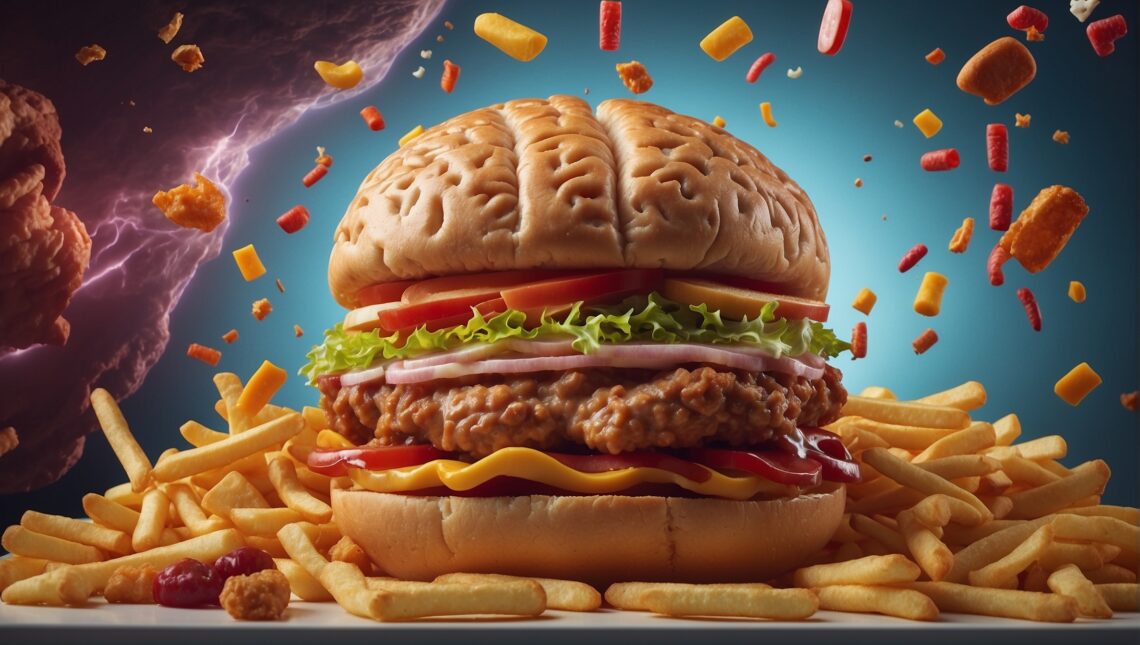
How Processed Foods Trick Our Brains
In today’s fast-paced society, convenience often trumps nutritional value when it comes to food choices. This shift has led to an increased consumption of processed and unhealthy foods. However, the impact of these foods extends beyond mere nutritional deficiencies; they fundamentally alter our brain’s perception of hunger and satiety, leading to a vicious cycle of cravings and overeating. This article delves into the neurophysiological mechanisms behind this phenomenon, exploring how processed foods can hijack our brain’s reward system and influence our eating behaviours.
The Role of the Brain in Eating Behaviour
Eating is regulated by a complex interplay between various parts of the brain, hormones, and neurotransmitters. The hypothalamus, a small region in the brain, plays a crucial role in regulating hunger and satiety. It responds to signals like ghrelin (a hormone that stimulates appetite) and leptin (a hormone that signals fullness). Normally, this system helps maintain energy balance and body weight.
Processed Foods and the Brain’s Reward System
Processed foods, often high in sugar, fat, and salt, activate the brain’s reward system more potently than natural foods do. This system, involving the neurotransmitter known as dopamine, is designed to reward behaviours essential for survival, like eating. However, the unnaturally high levels of these palatable substances in processed foods lead to an exaggerated release of dopamine. This heightened dopamine release creates a pleasure response stronger than what is elicited by natural foods. Consequently, the brain begins to associate processed foods with a rewarding experience, creating powerful food cravings. Over time, this can lead to a reduced sensitivity to dopamine, meaning more of the processed food is needed to achieve the same pleasure, a phenomenon akin to drug addiction.
The Impact on Hunger and Satiety Signals
The overconsumption of processed foods can disrupt the normal functioning of hunger and satiety hormones. For example, high sugar intake can lead to insulin resistance, which impairs the brain’s ability to respond to leptin, the hormone that signals satiety. This disruption can lead to overeating, as the brain fails to receive accurate signals that the body has had enough food.
The Role of Sugar and Fat
Sugar and fat are particularly potent in altering brain chemistry. Sugar triggers the release of opioids and dopamine, contributing to its addictive potential. Fat, on the other hand, has been shown to influence gut hormones that communicate with the brain, affecting feelings of fullness and satisfaction.
The Psychological Aspect
There’s also a psychological dimension to cravings for unhealthy foods. Stress, emotional eating, and habits formed during childhood can all influence food preferences. Processed foods often become a source of comfort or a quick fix for stress relief, reinforcing their consumption through psychological pathways.
Strategies to Combat Unhealthy Food Cravings
- Mindful Eating: Pay attention to what and how you eat. Eating slowly and without distraction can help recognize natural hunger and fullness cues.
- Balanced Diet: Incorporating a variety of whole foods like fruits, vegetables, whole grains, and lean proteins can provide essential nutrients and reduce cravings for processed foods.
- Understanding Triggers: Identifying emotional and environmental triggers that lead to unhealthy eating can help in developing healthier responses to these cues.
- Regular Exercise: Physical activity can regulate hormones and neurotransmitters, reducing the urge to eat unhealthy foods.
- Adequate Sleep: Lack of sleep can disrupt hormonal balance, leading to increased hunger and appetite.
- Hydration: Sometimes thirst is misinterpreted as hunger. Drinking water can help manage unnecessary food cravings.
The relationship between processed food consumption and brain function is a testament to the intricate ways our environment and lifestyle choices influence our health. Understanding the neural mechanisms that underlie cravings for unhealthy foods is crucial in developing effective strategies to combat this growing health issue. By adopting healthier eating habits and lifestyle changes, we can retrain our brain to enjoy natural, nutritious foods, breaking free of the processed food cycle.

